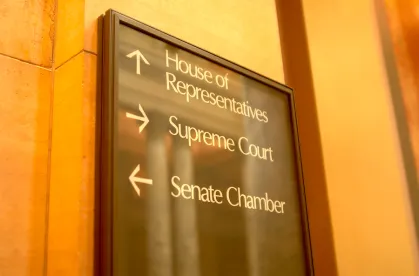Joint-Employer Comment Docket Closes.
As the Buzz mentioned previously, February 11, 2019, was the due date for submission of reply comments on the National Labor Relations Board’s proposed joint-employer rule. The next step will be promulgation of a final rule, perhaps by the fall of this year.
OFCCP Olive Branch.
This week the Office of Federal Contract Compliance Programs (OFCCP) announced yet another new directive. This one establishes the Voluntary Enterprise‐wide Review Program (VERP). While the VERP sounds like a form of indigestion, it is intended to relieve some compliance heartburn by recognizing “high-performing” federal contractors that have “model diversity and inclusion programs.” Contractors that meet this criteria and are accepted into the VERP will be not be included in the pool of federal contractors that might be scheduled for a compliance audit. The program is scheduled to begin in fiscal year 2020.
Paycheck Fairness Act on the Move.
On February 13, 2019, the U.S. House of Representatives Subcommittee on Civil Rights and Human Services and the Subcommittee on Workforce Protections held a hearing on the Paycheck Fairness Act (PFA). The bill has a whopping 239 cosponsors—more than enough to pass the House. But with the Republican-controlled Senate likely to balk at the PFA’s unlimited compensatory and punitive damages, class action facilitation, and wage data collection provisions, the Buzz will be watching to see if proponents of the bill make any changes that might attract Senate Republicans to their side.
Workplace Safety, Leave, and Age Discrimination Legislation Introduced.
In addition to the pay equity hearing described above, several pieces of legislation impacting the workplace were introduced this week:
-
In the House, Democrats this week reintroduced the Protecting America’s Workers Act (PAWA). Among other provisions, PAWA would expand the scope of coverage of the Occupational Safety and Health Act, increase penalties on employers, codify the Occupational Safety and Health Administration’s (OSHA) rescinded “Volks” regulation, and reinstitute the electronic reporting requirements of OSHA’s 2016 injury and illness tracking regulation. The Buzz would not be surprised if the House Committee on Education and Labor holds a hearing on this bill sometime in the near future.
-
On February 12, 2019, Congresswoman Rosa DeLauro (D-CT) and Senator Kirsten Gillibrand (D-NY) reintroduced the Family and Medical Insurance Leave (FAMILY) Act, which is essentially paid Family and Medical Leave Act (FMLA) leave funded through taxes on both employees and employers.
-
Finally, because Republicans can’t let Democrats have all the fun, on February 14, 2019, a bipartisan group of lawmakers in the Senate and House reintroduced the Protecting Older Workers Against Discrimination Act. The bill would reverse a 2009 Supreme Court of the United States decision by amending the Age Discrimination in Employment Act to allow for mixed-motive discrimination claims.
Per-Country Caps Bill Reintroduced.
Late last week, a bipartisan group of legislators introduced the Fairness for High-Skilled Immigrants Act of 2019 in both the Senate and House. The bill would eliminate the per-country caps for employment-based immigrants. There is significant bipartisan support for the bill, and it was previously included as part of a Department of Homeland Security appropriation bill that cleared the House Appropriations Committee in the summer of 2018. Could this be that rainbow-unicorn-of-a-bill in which Democrats and Republicans find consensus? On immigration, no less? Finding agreement is always a challenge in Congress these days, but this bill bears watching.
Inaugural Impeachment.
This week, way back in 1795, President George Washington nominated Judge John Pickering to the United States District Court for the District of New Hampshire. Pickering is famous for being the first U.S. federal official to be impeached. What got Pickering impeached, you ask? It’s a long story, of course, but the House of Representatives didn’t exactly mince words in its Articles of Impeachment against Pickering:
[T]he said John Pickering, being a man of loose morals and intemperate habits, on the 11th and 12th days of November, in the year 1802, being then judge of the district court in and for the district of New Hampshire, did appear on the bench of the said court for the administration of justice in a state of total intoxication, produced by the free and intemperate use of intoxicating liquors; and did then and there frequently, in a most profane and indecent manner, invoke the name of the Supreme Being, to the evil example of all the good citizens of the United States; and was then and there guilty of other high misdemeanors, disgraceful to his own character as a judge and degrading to the honor of the United States.
The Senate convicted Pickering (on a 19–7 vote) in March of 1804, and he was immediately removed from his position on the court.




 />i
/>i
